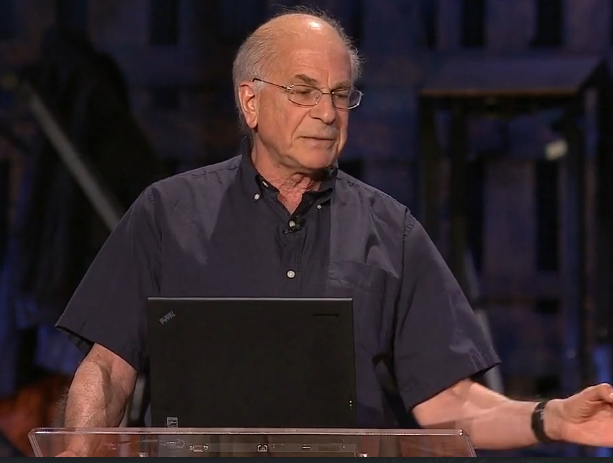I mean, most of the moments of our life --
我們生活中的大多片刻--
and I calculated, you know, the psychological present is said to be about three seconds long;
我算了算--從心理學(xué)角度來說僅僅只是三秒長。
that means that, you know, in a life there are about 600 million of them;
這意味著人一生中大約有六億個片刻。
in a month, there are about 600,000 -- most of them don't leave a trace.
一個月里則大約有六十萬個片刻。它們大多不留痕跡。
Most of them are completely ignored by the remembering self.
大多數(shù)皆被記憶自我全然忽視了。
And yet, somehow you get the sense that they should count,
然而,你現(xiàn)在亦應(yīng)發(fā)現(xiàn)一些感覺被儲存,
that what happens during these moments of experience is our life.
因?yàn)槲覀兘?jīng)驗(yàn)中的每分每秒合在一起就構(gòu)成了我們的人生。

It's the finite resource that we're spending while we're on this earth.
只要我們活著,我們就會消耗這些有限的資源。
And how to spend it would seem to be relevant,
該如何使用它們似乎是很重要的,
but that is not the story that the remembering self keeps for us.
但這不是記憶自我所留給我們的故事。
So we have the remembering self and the experiencing self, and they're really quite distinct.
因此記憶自我和經(jīng)驗(yàn)自我是很好區(qū)別的。
The biggest difference between them is in the handling of time.
他們之間的最大不同是在于處理時間的方式。
From the point of view of the experiencing self, if you have a vacation,
就經(jīng)驗(yàn)自我而言,如果你有一個假期,
and the second week is just as good as the first,
第二周和第一周同等快樂,
then the two-week vacation is twice as good as the one-week vacation.
那么兩周下來快樂的分量是一周假期的兩倍多。
That's not the way it works at all for the remembering self.
然而記憶自我則不是這樣算的。
For the remembering self, a two-week vacation is barely better than the one-week vacation
對記憶自我來說,兩周假期并不比一周假期多多少,
because there are no new memories added.
因?yàn)槠陂g沒有任何新記憶的加入。
You have not changed the story.
故事的劇情依然如舊。











